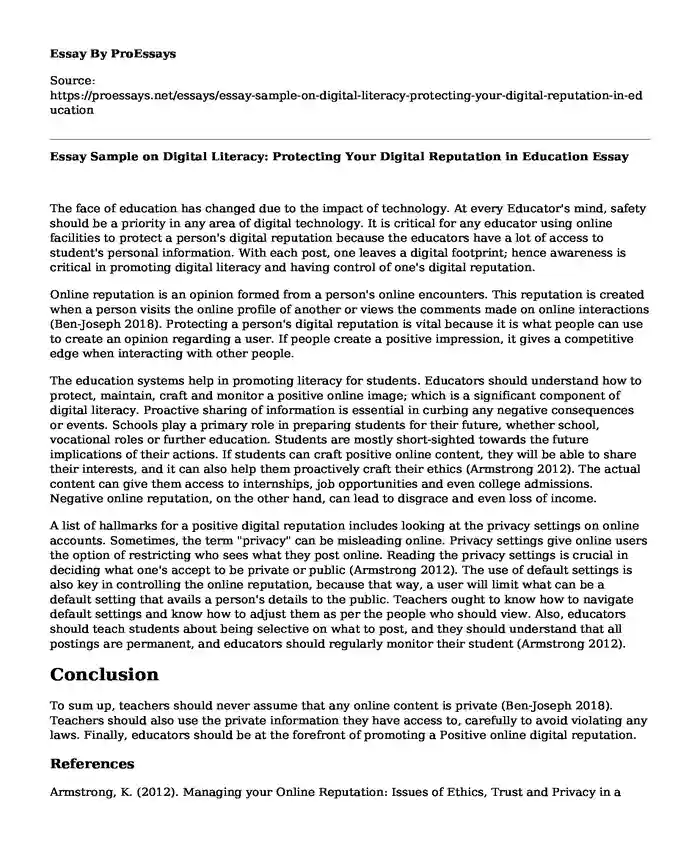The face of education has changed due to the impact of technology. At every Educator's mind, safety should be a priority in any area of digital technology. It is critical for any educator using online facilities to protect a person's digital reputation because the educators have a lot of access to student's personal information. With each post, one leaves a digital footprint; hence awareness is critical in promoting digital literacy and having control of one's digital reputation.
Online reputation is an opinion formed from a person's online encounters. This reputation is created when a person visits the online profile of another or views the comments made on online interactions (Ben-Joseph 2018). Protecting a person's digital reputation is vital because it is what people can use to create an opinion regarding a user. If people create a positive impression, it gives a competitive edge when interacting with other people.
The education systems help in promoting literacy for students. Educators should understand how to protect, maintain, craft and monitor a positive online image; which is a significant component of digital literacy. Proactive sharing of information is essential in curbing any negative consequences or events. Schools play a primary role in preparing students for their future, whether school, vocational roles or further education. Students are mostly short-sighted towards the future implications of their actions. If students can craft positive online content, they will be able to share their interests, and it can also help them proactively craft their ethics (Armstrong 2012). The actual content can give them access to internships, job opportunities and even college admissions. Negative online reputation, on the other hand, can lead to disgrace and even loss of income.
A list of hallmarks for a positive digital reputation includes looking at the privacy settings on online accounts. Sometimes, the term "privacy" can be misleading online. Privacy settings give online users the option of restricting who sees what they post online. Reading the privacy settings is crucial in deciding what one's accept to be private or public (Armstrong 2012). The use of default settings is also key in controlling the online reputation, because that way, a user will limit what can be a default setting that avails a person's details to the public. Teachers ought to know how to navigate default settings and know how to adjust them as per the people who should view. Also, educators should teach students about being selective on what to post, and they should understand that all postings are permanent, and educators should regularly monitor their student (Armstrong 2012).
Conclusion
To sum up, teachers should never assume that any online content is private (Ben-Joseph 2018). Teachers should also use the private information they have access to, carefully to avoid violating any laws. Finally, educators should be at the forefront of promoting a Positive online digital reputation.
References
Armstrong, K. (2012). Managing your Online Reputation: Issues of Ethics, Trust and Privacy in a Wired,‘No Place to Hide ’ World. World Academy of Science Engineering and Technology, 64, 848-853. https://pdfs.semanticscholar.org/f1f2/f400d4a310a78d230c8a3ff3ee7805cd0a01.pdf
Ben-Joseph, E. P. (2018). Teaching kids to be smart about social media. Retrieved from. https://kidshealth.org/en/teens/online-id.html
Cite this page
Essay Sample on Digital Literacy: Protecting Your Digital Reputation in Education. (2023, Oct 29). Retrieved from https://proessays.net/essays/essay-sample-on-digital-literacy-protecting-your-digital-reputation-in-education
If you are the original author of this essay and no longer wish to have it published on the ProEssays website, please click below to request its removal:
- Learning English as a Foreign Language in Saudi Arabia
- Paper Example on Factors Affecting Student Achievement
- Addressing Obesity Amongst College Students Essay
- Essay Sample on Campus Crimes
- A Childhood Dream Fulfilled: Essay Sample on My Journey to Becoming a Nurse
- Essay Example on the Path to My Academic Growth: Engineering & Management
- Schools: Building Cohesive Environments to Prevent Shootings - Essay Sample







